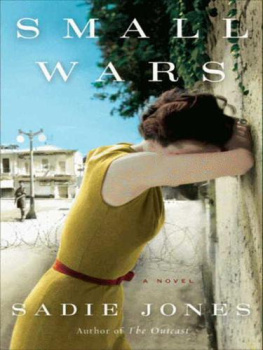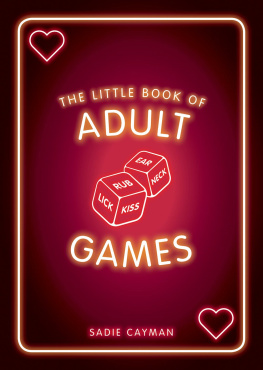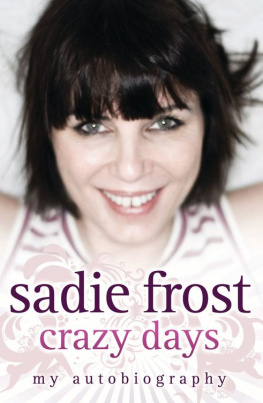Sadie Jones - Small Wars
Here you can read online Sadie Jones - Small Wars full text of the book (entire story) in english for free. Download pdf and epub, get meaning, cover and reviews about this ebook. year: 2011, publisher: HarperCollins, genre: Detective and thriller. Description of the work, (preface) as well as reviews are available. Best literature library LitArk.com created for fans of good reading and offers a wide selection of genres:
Romance novel
Science fiction
Adventure
Detective
Science
History
Home and family
Prose
Art
Politics
Computer
Non-fiction
Religion
Business
Children
Humor
Choose a favorite category and find really read worthwhile books. Enjoy immersion in the world of imagination, feel the emotions of the characters or learn something new for yourself, make an fascinating discovery.
- Book:Small Wars
- Author:
- Publisher:HarperCollins
- Genre:
- Year:2011
- Rating:3 / 5
- Favourites:Add to favourites
- Your mark:
- 60
- 1
- 2
- 3
- 4
- 5
Small Wars: summary, description and annotation
We offer to read an annotation, description, summary or preface (depends on what the author of the book "Small Wars" wrote himself). If you haven't found the necessary information about the book — write in the comments, we will try to find it.
Small Wars — read online for free the complete book (whole text) full work
Below is the text of the book, divided by pages. System saving the place of the last page read, allows you to conveniently read the book "Small Wars" online for free, without having to search again every time where you left off. Put a bookmark, and you can go to the page where you finished reading at any time.
Font size:
Interval:
Bookmark:
For Tim Boyd

Sandhurst, July 1946
An English rain was falling onto the instruments of the band, onto their olive green uniforms and the uniforms of the cadets as they marched. The quiet rain lay in drops on the umbrellas of the families watching, on the mens felt hats and the womens gloved hands; it dampened the grey and green countryside around them and put beads of water onto everything.
The band played Auld Lang Syne. The sound of the commands of the cadets and of the marching feet seemed to promise a bright future that was grounded in England and in discipline; the love of one made strong by the application of the other.
The families stood in a crowd ten deep, bordering the parade square. The small band and the marching cadets were between them and the long, white, columned building. The cadets held rifles and wore dark green battledress. The wool of their uniforms was dense and damp in the weather. The marching feet and rifles and tilted heads made patterns, so that their mothers could hardly tell one from another and felt embarrassed about it, but proud too, because their sons had become part of a greater body and did not stand out.
Some mothers and fathers had seen the passing-out parades of other sons, and many of the fathers remembered their own. This parade, in 1946, like England herself, lacked opulence but had its own austere ceremony. It was not the sunny, decorative ceremony of established peacetime, but resolute and businesslike, as if these men, like those of only a few months before, would be dispatched immediately into battle.
There was almost no self-consciousness at the emotion of the occasion: it was designed to be emotional and there was nobody there who did not feel it. The only time Hal Treherne could remember his father choked with feeling was in describing the day of his own Sovereigns Parade.
Hal was not choked with feeling: he had only the desire to do well that he always had, immense pride, like a physical thing, and a powerful eagerness to meet his future and to conquer it. He wasnt thinking about these things though; he was thinking about the precise execution of this small part of his training, drilled, redrilled, and accomplished. It was afterwards, as they stood in silence for inspection by the Princess Elizabeth rifles up to the shoulder, eyes front then, suddenly, he felt it, a sort of overflowing, and he had to blink and focus carefully on the far trees.
There was almost total quiet as everybody watched the young princess walk down the line of cadets. Hal could hear the sound of the footsteps approaching. He knew that she was the embodiment of his country, that he was doing his best to please and that he always would. He thought of God his hazy, humble idea of God and dared to hope he could please Him, too.
Hal, flanked by his peers and not alone, thought briefly of his father, watching him from the crowd, with all his battles behind him, and of his mother, next to him, quietly satisfied. Then his mind focused again on the exact present. The group of officers, aides and the princess came into the side of his vision, and across it, and his eyes didnt waver. He could see the top of her cream-coloured hat out of focus at the bottom of his field of vision. She paused briefly, she passed him and she moved on, and the small group with her moved on too, down the line.
Hals girl was called Clara Ward. She was watching from the crowd with her parents and younger brother and later, at the Sovereigns Ball, she would dance with him. Clara was the sister of Hals friend James. Hal had gone back with James to stay with his family a few times in Buckinghamshire, and that was how they had met.
Clara and Jamess family house was a village house, a wide red-brick villa, with white painted door and gate, white sills and sashes and a big garden. It had a lilac tree, apple trees, roses and a well-kept lawn that had a stream with a small bridge over it. Clara and her two brothers had grown up there and gone to and from their various schools and the house showed the small scars of their childhood in its crooked swing and worn carpets.
It was a house for Christmases and summers, for school holidays, rocking horses and chickenpox. It had seen wooden toys, rattles, satchels and raincoats and then, later, it had seen evening clothes and beaded bags on thin chains left on the hall chairs as Clara and James, tired from their parties, went upstairs to bed.
Hal had seen Clara for the first time one weekend, in the first weeks of his training.
They had arrived after tea on a Saturday. James had been talking to his father about money, and Hal had thought hed better go out into the garden for a smoke and to be out of the way.
There was a blueish dusk just settling and Clara was coming into the drawing room; she had her arms full of wet flowers, and Hal avoiding a small table had almost bumped into her. He had apologised and they had shaken hands awkwardly. Her hand was wet from the flowers. Hal said, You must be Jamess sister, and Clara answered, Yes, Im Clara.
She said Clara as her brother did to rhyme with dare or fair and then, Are you Hal?
Yes. Hal, and he had been silenced by her voice and the look of her, and had not known what to say.
They stepped around each other. He had gone out into the garden and had his cigarette; she had gone into the kitchen to put the flowers in water, but the picture of her stayed in his mind. She was pale and had dark brown hair, the colour of conkers or a bay horse, and her eyes were marine blue. She was seventeen then; he was nineteen.
Hal had set about seeing more of Clara with determination, and over the few months of his training he would come back with James whenever they were allowed a weekend.
His own parents house was near Warminster, in Somerset, not far from Stonehenge. It was faced with dark grey and had a well-proportioned front and other older and more complicated sections attached and interlocking behind. It bore the wind that came off Salisbury Plain stoically, with barely a rattle of its Victorian windows. Hal was always happy to be back in the big chilly rooms, with their familiar echoes; the gilt-framed paintings, the grim colours of the house, and its coldness, were nourishing to him. Although before visiting the Wards, he had never noticed the look of his own house before, he still felt more comfortable with its discomfort than he ever did in that light village house. He was happy with the silent mealtimes and bare boards of home, but he needed to be near Clara, and tolerated her jolly, messy family well enough to see her.
Hal and Clara had written to one another, letters more intimate than they ever were face to face. He called her his red, white and blue girl for her colouring and when he asked her to come with him to the Sovereigns Parade and ball it wasnt surprising, but it was significant.
Clara stood with her parents and younger brother, trying to pick out Hal and James from the lines of cadets, straining up onto her toes to see over the people in front, while twenty feet away, Arthur and Jean Treherne, in the front row, watched too.
Arthur Treherne and George Ward could not have been more different. George was a kind, fastidious man, and smallish. His trousers had one soft crease at the ankle and his overcoats spoke of dim offices and hatstands in domestic hallways. James was the first of their family to go into the army as a professional soldier, and they had watched his absorption into that world with something like dread.
George was a civil servant; he had gone to work every day from the red-brick villa in Buckinghamshire, returning each night to Moira, Clara and their two sons. He had fought briefly in the First War. It had been still was the unequalled crisis of his life. He didnt feel soldiering was anything one would choose to do, and was sharply aware that the greater part of his wish for continued peace in the world was so that his sons would not have to do the things he had done, and that his daughter would not have to be a soldiers wife. And yet here he was, his powerful distate and fear mixing with a pride that was almost beyond his control.
Font size:
Interval:
Bookmark:
Similar books «Small Wars»
Look at similar books to Small Wars. We have selected literature similar in name and meaning in the hope of providing readers with more options to find new, interesting, not yet read works.
Discussion, reviews of the book Small Wars and just readers' own opinions. Leave your comments, write what you think about the work, its meaning or the main characters. Specify what exactly you liked and what you didn't like, and why you think so.









